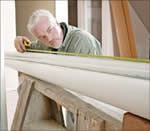Organic PVC Stabilizers Move from Europe to U.S.
A line of organic PVC heat stabilizers designed to replace heavy-metal stabilizers in environmentally sensitive European markets is now gaining a foothold in North America.
A line of organic PVC heat stabilizers designed to replace heavy-metal stabilizers in environmentally sensitive European markets is now gaining a foothold in North America. Originally developed for rigids, the new stabilizers have proven their mettle in flexible applications as well.
These OBS (Organic Based Stabilizer) additives from Crompton Corp. were introduced about six years ago to help European pipe makers replace lead. Since then, OBS also has made inroads in rigid injection molding, indoor profiles, and sheet—and as a replacement for barium and zinc in flexibles.
North American vinyl processors are not under regulatory pressure to replace organotins in rigid PVC or barium and zinc mixed-metal stabilizers in flexibles. Still, OBS stabilizers offer manufacturers an opportunity to be "ahead of the game" in environmental responsibility, according to Crompton sources. They see an emerging U.S. interest in moving away from heavy metals in selected applications—for example, some flexible vinyls that now contain barium and zinc. Vinyl products exported to Europe might be especially ripe targets.
Better but not pricier
Although proprietary, patented OBS chemistry is based on uracil, which is naturally present in the human body as one of the four building blocks of RNA nucleic acids. It reportedly protects PVC from color development during processing and suppresses cross-linking better than lead and Ca/Zn stabilizers. OBS stabilizers contain no heavy metals—lead, barium, zinc, tin, or cadmium—although some versions do contain calcium.
Lubrication of vinyls with OBS stabilizers is similar to formulations with organotins or mixed metals. Compared with standard stabilizers, OBS is priced competitively and provides some improvements in performance, Crompton claims. These benefits include low migration, low odor, low VOC emissions, good initial color and excellent transparency—especially in flexibles.
Owing to suppression of cross-linking, PVC stabilized with OBS resists rapid torque increase when exposed to high temperature and shear for much longer than systems with lead or Ca/Zn stabilizers. OBS compounds are also reportedly suitable for recycling—there are no interactions (such as cross-staining) with other stabilizers and only a minor decrease in thermal stability after reprocessing five times, Crompton claims.
Crompton’s original OBS 200 series is recommended for pipe. Crompton says it meets indirect food-contact regulations and has drinking-water approvals in several countries. OBS pipe compounds can be processed on standard equipment and tooling and provide a wide processing window.
For rigid injection molding, such as pressure fittings, the OBS 300 series reportedly provides processing behavior comparable to traditional materials but with no odor and high HDT. Also, oven tests show good delamination resistance.
The OBS 500 series is designed for other rigid PVC applications including cable conduit, indoor profiles, price tags, furniture edge banding, and foamed sheet.
For flexible PVC indoor applications, the OBS N and OBS O series are tailored to flooring, auto interiors, and wall coverings.
Related Content
-
How to Maintain Pelletizing Quality When Acid Attacks
Developments in the chemistry of polymers and additives have made corrosion a real problem in pelletizers. Here’s how to ward it off.
-
More Than a Compounder: They Have the Science to Create New Custom Materials
Insight Polymers & Compounders leverages its expertise in polymer chemistry to develop next-generation materials.
-
10 Ways to Improve Twin-Screw Compounding Performance
There are many techniques known to operators and plant engineers for increasing the performance of a twin-screw compounding extruder.


















